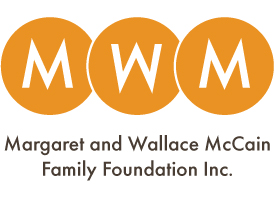Integrated Children's Centres in Atlantic Canada
Les centres de développement de la petite enfance au Canada Atlantique
The Government of New Brunswick, the Department of Education and Early Childhood Development of Prince Edward Island and the Department of Education in Nova Scotia have partnered with the Margaret and Wallace McCain Family Foundation Inc., to sponsor community networks to create integrated children’s centres. The nine sites involved in New Brunswick are part of a three-year pilot project and reflect the urban and rural, Francophone and Anglophone diversity of the region. Four Early Years Centres in PEI are modeling outreach to families who would normally not participate in group programs and Nova Scotia is building on its Schools Plus initiative.
While each jurisdiction will create its own path based on its unique history, culture, resources and circumstances, the evaluation of the projects will be used to inform program practice and assist policy makers in building a comprehensive, assessable, and accountable family-oriented early childhood education and care system.
Features of an Integrated Children’s Centre
The integrated children’s centre model combines regulated child care, education, family and community health services into a single, accessible program designed to meet the needs of children and their families from the prenatal period through to the transition to the elementary school. By demonstrating the possible, the efforts inform program practice and provide policy makers with a guide to building a comprehensive, accessible, accountable child and family service system.
Combined Resources: Child care, schools and family and community health services pool their resources, including staff, facilities, program supplies and administrative infrastructure, to create an inclusive, flexible full day, year-round program.
Staff Team: Teachers, early childhood educators, family support and health professionals work as a team to plan and deliver program activities. Informed and supportive leadership, adequate planning time and joint professional development creates a common approach to programming.
Parent Participation: Children’s healthy development and joy in learning requires a reciprocal partnership between parents and staff. Parents are always welcomed and encouraged to take part in their children’s programming. They participate in governance structures, join in their children’s activities, and take classes at the school.
Seamless Access: Schools are the neighbourhood hubs for child and family services. There is a single intake procedure and a schedule that provides parents with full day, year-round flexible enrolment options. Fees, where charged, are not a barrier to access.
Community Partnerships: The model recognizes that the well- being of children is directly linked to the welfare of their families and communities. The school site provides universal access to the learning, care and family supports that most families use and provides a platform to deliver public health and intervention supports. Staff members also link families to community resources and mentor them in accessing social services or specialized programs.
The Policy Context
New Brunswick
In June 2008, the Government of New Brunswick, under the leadership of the Ministerial Committee on Early Childhood Development and Care[1],released Be Ready for Success: A 10 Year Early Childhood Strategy for New Brunswick, the province’s first long-term strategy for early learning and child care in New Brunswick. This strategy complements the provincial Education Plan, When Kids Come First, the provincial Health Plan, Transforming New Brunswick’s Healthcare System, theprovincial wellness strategy Live Well, Be Well, and the provincial poverty reduction plan Overcoming Poverty Together: The New Brunswick Economic and Social Inclusion Plan.
In the first year of Be Ready for Success, the Government of New Brunswick selected four demonstration sites to test the concept of early childhood development centers as a way to better integrate early childhood services. It further committed to provide grant funding of $400,000 per year ($100,000 each site) for a three-year period with the expectation that the sites would be self-sustaining following completion of the pilot project.
In 2009, the Margaret and Wallace McCain Family Foundation Inc. and Government agreed to partner to add an additional five demonstration sites, provide a research and evaluation strategy, support site development and communications and participate on the Interdepartmental Working Group.
These demonstration sites are primarily located in schools and integrate existing preschool, child care and parenting programs and education under one roof. The centres serve as neighborhood hubs where early childhood services can be accessed in an integrated way, under the direction of a local community network and non-profit board of directors.
Prince Edward Island
Based on a history of success with integrated service delivery elsewhere, the Margaret and Wallace McCain Family Foundation Inc. approached CHANCES, a multi-service community agency to demonstrate the model within the PEI context. With the participation of the Department of Education and Early Childhood Development and the Eastern School District, Smart Start was created. This school/community partnership offers local families a full-service continuum of pre-and post-natal resources, nutrition counselling, an early development program for infants and toddlers, school-based pre-school for two to four year olds, and child/parent activities and resources. The Smart Start initiative provides valuable learnings to PEI’s 5-year Framework for Early Childhood Development.
Nova Scotia
SchoolsPlus is part of Nova Scotia’s child and youth strategy, Our Kids Are Worth It.
The strategy responds to Commissioner Nunn’s recommendation to improve co‑ordination and collaboration in the delivery of programs and services for children, youth, and families.
The vision for SchoolsPlus is that schools become a convenient place for government and other services to be delivered to families. This approach will make it easier for professionals to collaborate with each other on behalf of children, youth, and families. Families are served in a welcoming, accessible place that they are already familiar with—a school in their own community. Through its partnership with the Margaret and Wallace McCain Family Foundation Inc. the Chedabucto Education Centre in Guysborough has expanded programming to include preschool age children in an integrated educational and family support environment.
[1] The work of the Interdepartmental Working Group is overseen by the Interdepartmental Steering Committee on Early Childhood Center Demonstration Sites, comprised of representatives from the Department of Social Development (Chair), the Department of Education, the Department of Health, the Department of Wellness, Culture and Sport and the Margaret and Wallace McCain Family Foundation Inc.


